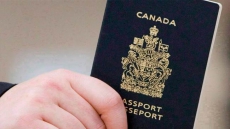OTTAWA — A long-running legal case about whether former Nazi death squad member Helmut Oberlander will be stripped of his citizenship is back in the hands of the federal government cabinet.
The Supreme Court of Canada said Thursday it will not hear the federal government's challenge of a setback in its latest bid to revoke Oberlander's citizenship.
As usual, the Supreme Court did not provide any reasons for its decision.
The office of Justice Minister Jody Wilson-Raybould had no immediate comment.
Oberlander, born in Ukraine, was a member of a Nazi death squad, the Ek 10a, which operated behind the German army's front line in the Eastern occupied territories during the Second World War.
It was part of a force responsible for killing more than two million people, most of them Jews.
Oberlander, 92, says he was conscripted into duty as a teenager and that the penalty for desertion was execution.
He served with the Ek 10a as an interpreter from 1941 to 1943. Living and travelling full time with the unit, his responsibilities also included finding and protecting food and polishing boots. He later served as an infantryman in the German army.
Oberlander says he never participated in any killings.

He and his wife came to Canada in 1954. Oberlander became a Canadian citizen six years later. He did not disclose his wartime experience when he applied to emigrate, upon entering Canada or when seeking citizenship.
The retired real estate developer, who lives in Waterloo, Ont., has been fighting federal attempts to revoke his citizenship and deport him since 1995.
In 2012, the federal government looked at whether Oberlander's assertion of duress was sufficient to excuse his complicity in the Ek 10a's activities. It decided against him and once again moved to strip his citizenship.
In February, the Federal Court of Appeal told the cabinet to reconsider the case.
The appeal court said Oberlander "was entitled to a determination of the extent to which he made a significant and knowing contribution to the crime or criminal purpose of the Ek 10a."
"Only then could a reasonable determination be made as to whether whatever harm he faced was more serious than the harm inflicted on others through his complicity."




